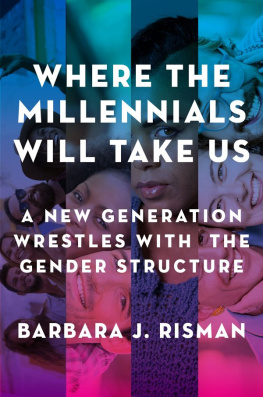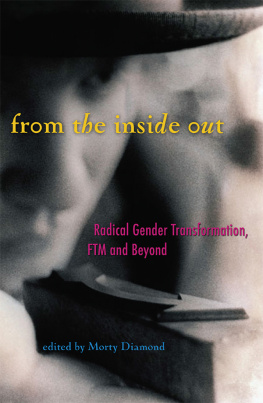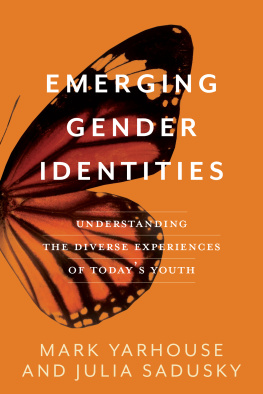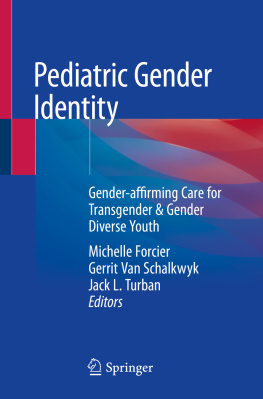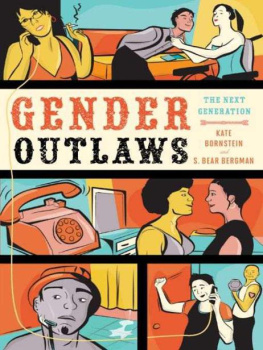WHERE THE MILLENNIALS WILL TAKE US

Oxford University Press is a department of the University of Oxford. It furthers the Universitys objective of excellence in research, scholarship, and education by publishing worldwide. Oxford is a registered trade mark of Oxford University Press in the UK and certain other countries.
Published in the United States of America by Oxford University Press
198 Madison Avenue, New York, NY 10016, United States of America.
Oxford University Press 2018
All rights reserved. No part of this publication may be reproduced, stored in a retrieval system, or transmitted, in any form or by any means, without the prior permission in writing of Oxford University Press, or as expressly permitted by law, by license, or under terms agreed with the appropriate reproduction rights organization. Inquiries concerning reproduction outside the scope of the above should be sent to the Rights Department, Oxford University Press, at the address above.
You must not circulate this work in any other form and you must impose this same condition on any acquirer.
Library of Congress Cataloging-in-Publication Data
Names: Risman, Barbara J., 1956 author.
Title: Where the millennials will take us : a new generation wrestles with the gender structure /
Barbara J. Risman.
Description: New York City : Oxford University Press, [2018] | Includes bibliographical references.
Identifiers: LCCN 2017019938| ISBN 9780199324392 (pbk.) | ISBN 9780199324385 (hardcover) |
ISBN 9780199324408 (updf) | ISBN 9780199324415 (epub)
Subjects: LCSH: Sex roleUnited States. | Gender expressionUnited States.
Classification: LCC HQ1075.5.U6 R57 2018 | DDC 305.30973dc23
LC record available at https://lccn.loc.gov/2017019938
Contents
NO BOOK IS written by the author alone, but this one is most clearly a collaborative effort. This project began as a theory book with empirical chapters illustrating the theoretical framework on topics as different as genderqueer youth, women in science, and hooking up. I agreed to teach a graduate qualitative methodology practicum in the sociology department at the University of Illinois at Chicago (UIC) with the goal to also collect data for one chapter in my book. The data were collected primarily by graduate students at UIC, and I owe that class a great debt and thank them immensely for making this project possible. I also thank my colleague and friend Kristen Myers who collaborated on data collection as did some of her students. What derailed the book I planned to write and led to this one was that the data we collected were just too rich, too important to condense into one chapter, and so my proposed book evolved into a book on Millennials. I thank my editor, James Cook, for being gracious enough to accept and encourage a finished project far different than the one promised. I also want to thank the 116 young adults, the Millennials, who took the time to talk with us and so openly share their life stories.
A book that takes as long to write as this one has had the generous contribution from scores of students and colleagues. Amy Brainer, William Scarborough, and Ray Sin were both invaluable as research assistants and as colleagues during the collection and analyses of these data. Thanks to Amy Brainer, Georgiann Davis, Jesse Holzman, Kristen Myers, William Scarborough, and Ray Sin for reading and providing invaluable feedback on a variety of chapters. Thanks also to Patricia Martin and Lisa Wade, as well as anonymous reviewers, for Oxford University Press for providing me with deep, careful, and very useful reading of my work. I also want to thank the graduate students who have taken courses with me in the last few years for their thoughtful feedback of chapters as they have been developed.
I have had the very good fortune of teaching as University of Illinois at Chicago where my colleagues have been supportive of my research even as I was officially supposed to be focusing on departmental administration. I want to thank my UIC Colleagues and the university itself for granting me a sabbatical during 201516 to work on this book. I spent my sabbatical as a Fellow at the Center for Advanced Study in the Behavioral Sciences at Stanford and owe a deep debt of gratitude to the Center for inviting me. My fellowship provided both the quiet peaceful writing study and the energetic intellectually stimulating interaction with the rest of the 20152016 cohort. This book would have been far different, and less well written, were it not for my writing group at CASBS. Thanks to my wonderful writing group, including Victoria Bernal, Joshua Gamson, Glenn Loury, Natasha Iskander, Maureen Perry-Jenkins, and Mick Smyer. I also owe a debt of gratitude to my CASBS meditation and yoga groups for helping me stay focused on the task at hand while enjoying the privilege of our time together at CASBS. Over the course of writing this book, I had the opportunity to present ideas as they formed and chapters as they were being written in many university settings, including Southern Illinois University, the University of Trento, the University of Turin, the University of Milan, the University of Genoa, the University of Tennessee, and my own department at the University of Illinois at Chicago. In every setting generous colleagues raised issues that helped the development of this project. Of course, for all the generous help of all these friends and colleagues throughout the years, the final product is mine alone, and I take responsibility for its weaknesses as well as its strengths.
Finally, and most importantly, I want to thank my family. As a mother of a Millennial, I have lived through the evolution of gender politics from my second wave feminism to my child Ashir Leah KaneRisman Coillbergs life experiences. I thank Ashir for all I learned from our journey together. And last, but not least, I want to thank my husband, Randall Liss. I have been working on this book the entire span of our relationship, from 2009 forward. No husband could better embody the possibility of true gender equality. From the moment of our marriage, my husband has devoted himself to supporting my work. Wherever in the world I travel to speak or teach, I have a travel companion. Our marriage exemplifies the fluidity of gender expectations as a man who was a primary breadwinner in a traditional first marriage became a most extravagant caretaker and homemaker in a second marriage. This book is dedicated to Randall, for being willing to fit his own work around mine, to support my writing schedule and professional responsibilities, to lovingly give me the support I needed to successfully be both a university administrator and a sociologist at the same time. Our relationship is proof that the gender structure is indeed changing.
WHERE THE MILLENNIALS WILL TAKE US
ITS ENOUGH TO make you dizzy: A woman presidential candidate wins the popular vote but loses the election to a man who brags about grabbing pussy; laws are passed to protect transgender peoples right to urinate in peace and then political battles rage about repeal; women earn more college degrees than men but remain far behind in average earning power; gay couples can marry but other Americans claim religious freedom to discriminate against them; paternal leave is offered by a few businesses, but when men take it their bosses doubt their organizational commitment; the Supreme Court long ago decided women have the right to control their own bodies and 50 years later that right may be challenged. Is gender equality a political football to be debated in Congress or a human right? How can we understand simultaneous advancements in gender and sexuality equity and sometimes what seems to be radical steps backward? Does gender still matter in the 21st century or have we moved beyond the need for a gender revolution?

